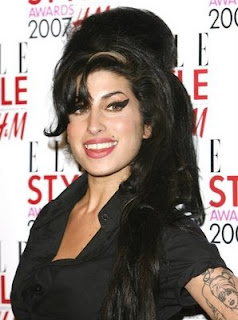Two albums regarded much more highly than perhaps they should be. Though it now appears to be a worse crime than telling many of the dark Sickipedia jokes that have sprung from this (e.g. What was Winehouse's biggest hit? Her last) for her lifelong and posthumously outspoken devotees, I'll fly against the wind. I didn't care for her music. Not the genre, because I love jazz. Not the band, who were great. I didn't care for her voice all that much, she wasn't bad but not the heavenly instrument people made her out to be and have for the last few days insisted upon. It's not a popular opinion, but it's not a cruel one before anyone tries to tell me otherwise. I just don't think she was that good.
But there's the issue. She was a goddess who was as invincible as she was flawed and troubled in many people's eyes (and ears), and that made her a glamourous bearer of burdens. Her music "spoke to people", in that hackneyed way that people without the imagination to express themselves resort to spouting song titles instead of their own feelings, usually with the word "totally" repeated ad nauseum. It's not fair on her to have her memory so beatified in the public eye. She was troubled, no one helped her, she paid for it. The desire to have a Billie Holiday, a Janis Joplin, whose presence in the public eye and latterly lack thereof made her appear unstoppable backfired dramatically, and the unexpecting "fans" who cultivated the recreational pharmaceutical timebomb were shocked that the creation in their minds wasn't real.
It doesn't just stay there. Celebrities almost endorsed the behaviour with a sort of "it'll be alright" attitude until the moment when she died, when it clearly wasn't alright but then turned her into a saint. Russell Brand's treatment in his Culture piece for the Guardian (
here.
) painted her as a "genius" with a blemish of suffering. The public on the evils of Twitter and Facebook have pooled out in support of this woman who at best, as far as I could ever tell, sang about as well as a lot of pub singers and at worst, the very, very worst being her performance in Belgrade, like a recently lobotomised Amy Winehouse. Through the wonders and disgusting facelessness of the internet, since her death videos of that performance have been uploaded hastily by people who had been sitting on them since last month. They have a huge hit rate. And they portray someone who clearly isn't drunk but caught in the throes of drug addiction, staring and scratching at her arms, lolling her head, covering her eyes and mouth and hugging herself. She's unsteady, and in the next second telling her backing singer quite forcefully "You do the words" halfway through Some Unholy War.There's more to this story, though. All of this has happened in an age far different to the era in which many other addicted musicians performed. Both Ray Charles and Johnny Cash battled addiction and forced themselves to stop. Winehouse's Belgrade gig should have been her wake-up call, so reminiscent it was of the performances Cash recounts in his biography Man In Black, particularly around Vegas. Musicians could get clean back then and leave rehab. Cash did it, Charles did it. After that technology and global media kicked in. Which is where the beginnings of this culture of tortured musicians with drug-addled "genius" bestowed upon them by the public lay, in the first musicians in the so called 27 Club.
The 27 Club is a group of musicians who all died at 27. Simple as that, except that they were all (or at least, the ones most readily associated with it-
see here.
for a full explanation) revered for their talent, and that awe grew with their deaths. It is a sad state when someone with evident, undeniable talent is lauded as genius by the public more for the age they stop living at than for the work they produced, but that is the fickle public. Work doesn't gain credit, something inexplicable attracts fandom- just look at who in their right mind would like Jedward.
A death is unbearable for the family and friends, and upsetting for fans, but outpourings have to stop where they're not warranted. Princess Diana was an example of what is perhaps the ultimate bandwaggon boarding anyone can perform- devoted fandom immediately after they no longer exist. How many people gave a care for her before this unexpected death? The question applies for both women, as Winehouse had more or less disappeared from public life, no news definitely seeming to be good news in that there were no more arrests, no more drunken acts caught on camera to run alongside international issues at six o'clock. There's nothing really more to say here, except that it is upsetting that someone who was at least doing what she wanted then has such fraudulent legacy laid upon her before she's even cold. The public are not remembering this singer as an average singer who sold very well with her first and only pair of albums. They want to carve her into a legend she never was.

I agree with your stance. While I was never a fan of her music either, I do think her death was nonetheless a tragedy, and I was disgusted by the fact that people were making cruel jokes about her the very day she died. But with all due respect to both her and her fans, I don't think she can be compared to people like Kurt Cobain or Jim Morrison. Theirs is a status not easily obtained, and I think it's safe to say that nobody would consider such comparisons were she still alive. Her music means something to the people who listen to it, and surely that's enough without turning her into something she's not.
ReplyDelete